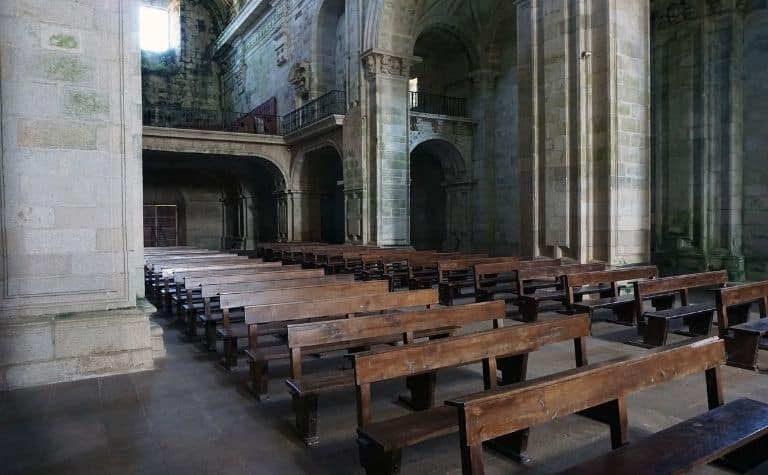Presbyterian churches have always been communities of worship because they believe God is worthy of honor and praise. Because of the tradition’s high view of Scripture, corporate worship in the Presbyterian tradition comes from the teachings of the Bible.
Presbyterian churches traditionally practice the Regulative Principle of Worship, though some denominations, synods, and churches have recently incorporated modern musical songs and styles. Prayer, Bible reading, preaching, and sacraments are also aspects of Presbyterian worship.
What is the “Regulative Principle of Worship” in Presbyterianism? What did John Calvin teach about corporate worship in the church? Do Presbyterian churches sing modern worship songs? Keep reading to learn more.
Also, see Presbyterian vs. Pentecostal: What’s the Difference? to learn more.

What Is the Regulative Principle of Worship?
The “Regulative Principle of Worship” is a traditional Presbyterian way of conducting church services, which is rooted in what Scripture clearly states about corporate worship while forbidding elements that Scripture prohibits or doesn’t explicitly mention.
It’s often contrasted with the so-called “Normative Principle of Worship,” which states that whatever Scripture doesn’t strictly prohibit is permissible as long as it doesn’t violate biblical principles.
| Regulative Principle of Worship | Normative Principle of Worship | |
|---|---|---|
| Allows | Whatever Scripture clearly states | Whatever Scripture doesn’t forbid |
| Forbids | Whatever Scripture clearly forbids or doesn’t clearly state | Whatever violates the principles of corporate worship according to Scripture |
| Adherents | Calvinist, Reformed, Anabaptist, and Restoration Movement churches | Lutheran, Methodist, Baptist, Assemblies of God, and most evangelical churches |
In summary, in the Calvinist tradition, corporate worship comprises elements that Scripture commands; in other Protestant traditions, corporate worship can consist of anything that Scripture doesn’t directly forbid. (Also see Presbyterian vs. Roman Catholic: What’s the Difference?)
Several historic Calvinist confessions affirm The Regulative Principle of Worship. However, the Westminster Confession of Faith is the most important.
It states, “But the acceptable way of worshipping the true God is instituted by Himself, and so limited by His own revealed will, that He may not be worshipped according to the imaginations and devices of men, or the suggestions of Satan, under any visible representation, or any other way not prescribed in the holy Scripture.” [1]
Key elements points (with an example)
Acceptable forms of worship are limited by God’s revealed will in Scripture. For example, since the Bible instructs churches to pray and illustrates the practice in New Testament stories, it’s acceptable for corporate worship. (It’s not merely “acceptable” but also edifying and sanctifying).
On the other hand, since “man-made” dramas or theatrical performances that illustrate a biblical principle aren’t in the Bible, they are forbidden as an element of corporate worship.
In this way, worshipping God in ways that Scripture doesn’t illustrate comes from “the imaginations and devices” of people or Satan: It’s often argued that artificial elements of corporate worship divert from the Bible and are therefore unpleasing to God and hinder the edification and sanctification of people.
These “imaginations” are the creation of sinful people and appeal to the world, the flesh, and the devil. Others argue that since Scripture doesn’t directly forbid dramas or theatrical performances, they are permissible as long as they reflect biblical principles.
Presbyterian pastor, Derek Thomas, argues for the Regulative Principle of Worship when he writes, “Put simply, the regulative principle of worship states that the corporate worship of God is to be founded upon specific directions of Scripture.”
He continues, “On the surface, it is difficult to see why anyone who values the authority of Scripture would find such a principle objectionable. Is not the whole of life itself to be lived according to the rule of Scripture?” [2]
Also, see Why Don’t Presbyterian Churches Have Altars?

Do Presbyterians Sing Modern Worship Songs?
Some Presbyterian churches sing modern worship songs, and others only sing hymns, and a few only single Psalms. Many churches blend styles to please various generations in their congregation.
Every denomination, and sometimes every individual synod or local church, approaches corporate worship through music differently.
Some Presbyterians oppose modern worship music: Some argue that modern worship songs are artificial and focus too much on the individual, not God. It’s further argued that modern worship songs are less substantive than the Psalms or 18th and 19th-century hymns. (Also see Presbyterian vs. Anglican: What’s the Difference?)
Other Presbyterians favor modern worship music: The contrary view states that the substance of many contemporary worship songs is biblical.
Some point out that all changes in worship music throughout Presbyterian history created tension, such as when people started to sing hymns in congregations and use new instruments. [4]
What Did Calvin Say About Worship Through Songs?
Calvin encouraged congregations to sing the Psalms. “When we have looked thoroughly everywhere and searched high and low, we shall find no better songs nor more appropriate to the purpose than the Psalms of David, which the Holy Spirit made and spoke through him.” However, Calvin includes some non-Psalm songs in his psalter, like the Apostles Creed. [3]
Also see Presbyterian vs. Lutheran; What’s the Difference?

What Is a Presbyterian Worship Service Like?
Presbyterian worship services often include the elements below regardless of denomination, synod, or church. However, each element’s content may differ depending on whether a church has held firm to biblical teaching and Calvinist theology or if it has drifted away from its roots and adopted modern worldviews.
Prayer: At certain points in the service, an individual may be encouraged to pray where they sit silently. At other times, an elder may lead the congregation in prayer. Some people may read corporate prayers aloud.
Other prayers may be impromptu, such as when the church prays for an ill member. In Matthew 21:13, Jesus said, “My house shall be called a house of prayer.” (Also, see Can Presbyterians Dance?)
Scripture: In many Presbyterian churches, Scripture is read aloud as an element of the service. A speaker and the congregation may take turns reading verses aloud. Paul tells Timothy: “Until I come, devote yourself to the public reading of Scripture, to exhortation, to teaching.” (1 Tim. 4:13)
Preaching: Preaching has always been a central part of Presbyterian services. Presbyterians believe the Bible is authoritative for all matters of faith and conduct. It not only prescribes how churches worship, but it provides instructions, encouragement, and wisdom for the rest of life as well.
Paul tells Timothy, “Preach the word; be ready in season and out of season; reprove, rebuke, and exhort, with complete patience and teaching.” (2 Tim. 4:2)
Song: Worship through singing is an important of Presbyterian worship services. See above for the variety of expressions this practice takes.
The Apostle Paul encourages the church at Colossae to “Let the word of Christ dwell in you richly, teaching and admonishing one another in all wisdom, singing psalms and hymns and spiritual songs, with thankfulness in your hearts to God” (Col. 3:16).
Sacraments: The Presbyterian tradition observes baptism and the Lord’s Supper. These are critical aspects of church life. Jesus commands people to be baptized (Matt. 28:19) and observe the Lord’s Supper (Matt. 26:26-29).
Some Presbyterian churches incorporate other elements like oaths, vows, and thanksgiving. The Westminster Confession states, “The reading of the Scriptures with godly fear, the sound preaching and conscionable hearing of the Word, in obedience unto God, with understanding, faith, and reverence; singing of psalms with grace in the heart.”
It continues, “As also, the due administration and worthy receiving of the sacraments instituted by Christ; are all parts of the ordinary religious worship of God: beside religious oaths, vows, solemn fastings, and thanksgivings, upon special occasions, which are, in their several times and seasons, to be used in a holy and religious manner.” (Chapter XXI, Westminster Confession of Faith)
Also see Presbyterian vs. Episcopalian: What’s the Difference?
References:
[1] Source
[2] Source
[3] Source
[4] Source
Related Questions
The Presbyterian and Episcopalian traditions are Protestant branches of the Christian faith that originated in 16th-century Europe. These denominations have much in common, especially when contrasted...
The Roman Catholic and Presbyterian branches of the Christian faith trace their origins to Jesus of Nazareth and his apostles, as well as their writings that comprise most of the New Testament. There...
